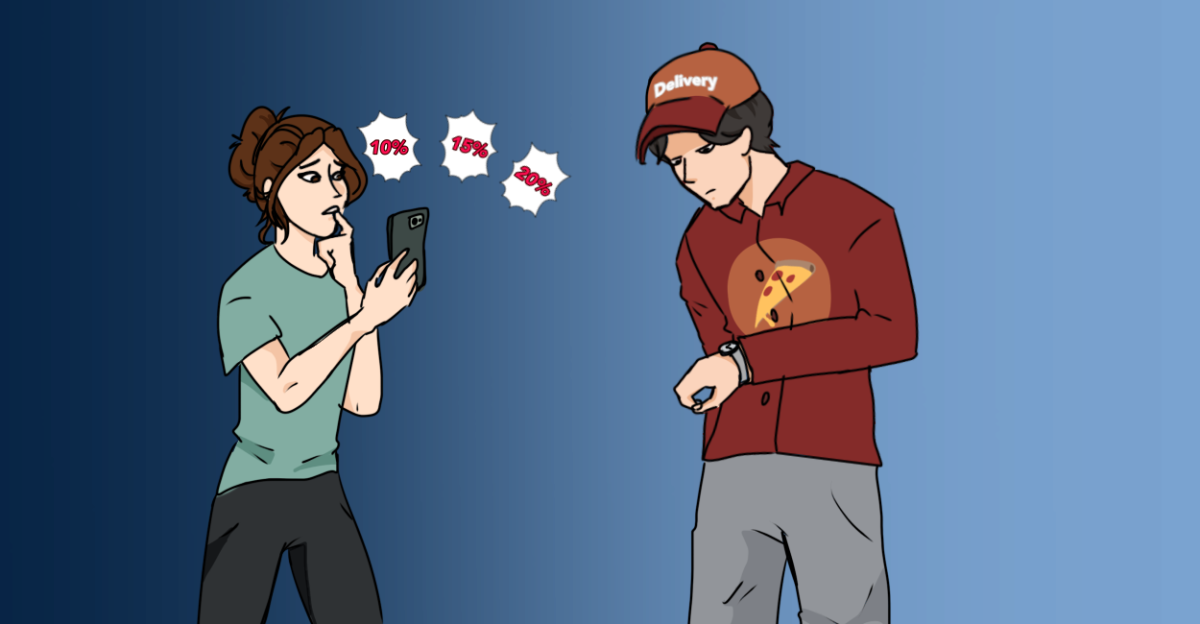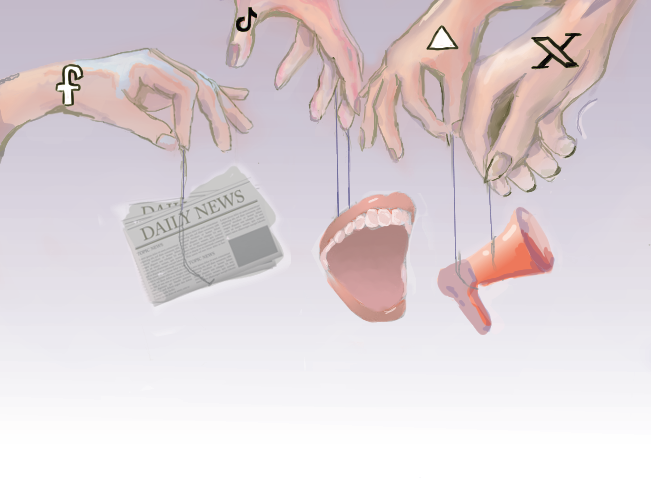Adrian stares at his phone, glaring at a food delivery app. He thinks about the past hour he spent waiting for his meal to arrive, only for it to show up cold and far from what he expected. The portions are smaller, the taste underwhelming and the overall experience disappointing. But as he scrolls down to the rating section, ready to skip the tip, he hesitates. He imagines his delivery driver rushing through traffic, having to deal with bad weather and piling orders. With a sigh, he adds a small tip before rating his driver five stars, the pressure to tip getting to him.
Before the COVID-19 pandemic, tipping was a practice reserved almost exclusively for restaurants, with the exception of services such as food delivery and nail salons, and tips served as a reflection of the time and effort of workers.
However, after the pandemic came the introduction of digital payment systems, which ask for tips at many types of businesses, including places where they were not previously given. As a result, many Marjory Stoneman Douglas High School students are starting to feel pressured to tip everywhere they go.
“Whenever I see the tablet with the [tipping] options on it, I feel like I have to tip, since the whole point of them [the employee] pulling it up is that they want you to tip them,” junior Ethan Friedman said.
In Florida, service workers–especially servers–usually make below minimum wage because of a law that allows tipped employees to be paid a minimum wage of $8.98 per hour and make the rest in tips. As a result, some students feel that tipping has become less about rewarding exceptional service, and more about not disappointing service workers who work hard to earn tips, which can make tipping feel more like a moral obligation than an optional reward.
“I feel guilty when I don’t tip because I feel like I’m turning down their [an employee’s] efforts,” sophomore Connie Chao said. “Especially in restaurants, I feel like I have to tip because they [the employees] are trying to gain your favor, so it feels like I’m disappointing them when I don’t tip.”
First introduced to the United States in the 1840s, tipping was simply intended to be a way to add a little extra to a deserving restaurant worker’s paycheck. If a customer gets great service, it is a nice way to say ‘thanks’ and encourage the same level of service next time.
However, as tipping becomes an increasingly critical part of service workers’ wages, its integration into a growing number of places has made some MSD students convinced that tipping is a mandatory practice.
“For a while, I had no idea tipping was even optional,” junior Adrian Blanc said. “I was so used to hearing people telling me I needed to tip 20%, but I never asked why.”
While some are feeling pressured to tip with this new system, others remain unfazed, opting to choose the “no tip” option when presented with tip amounts.
“No one’s pressuring me to pay more money if all you’re doing is saying ‘Hi, can I take your order?’ and leaving,” junior Josh Brown said.
Additionally, some students assert that the new tipping system is not something that should affect a customer’s decision to tip.
“I think tips are something that should be awarded for good service, not just something handed out to whoever shoves their tablet in my face,” senior Jayden Varillas said.
When it comes to whether the tipping system should change, students’ opinions are divided, as some students believe that the system should not change since the competitive nature of working for tips incentivizes workers to create a better atmosphere for paying customers.
“You know the job you took and that it relies on tips, so you have to put in the work to get that tip, otherwise it’s just free money,” Brown said. “It should stay that way because the whole point of a tip is that they [the worker] gave better than average service, and since most people give average service, there’s no point in tipping them.”
While some students believe that tipping culture is fine the way it is since it incentivizes good service, others argue that the system is due for a change, since higher wages negate the need for tipping in the first place.
“I think this system needs to change, and that waiters shouldn’t have to rely on their customers’ graciousness just to get by every week,” junior Coleman Campanella said. “Be the change you want to see in the world, because you’re not getting my change.”
While most people agree that tipping is beneficial for service workers today as it helps them earn a livable wage, it should come as no surprise that some argue for a system that takes tips out of the bill tomorrow. As a result of tipping becoming increasingly commonplace, the number of people who advocate for higher wages to replace tips is growing, though whether these options can coexist remains to be seen.









![National Honor Society Sponsor Lauren Saccomanno watches guest speaker Albert Price speak to NHS members. National Honor Society held their monthly meeting with Price on Monday, Nov. 4. "[Volunteering] varies on the years and the month, but we have started a couple new things; one of our officers Grace started a soccer program," Saccomanno said. "We have been able to continue older programs, too, like tutoring at Riverglades. NHS's goal is to have as many service projects as possible."](https://eagleeye.news/wp-content/uploads/2024/11/xNOeKNVwu7aErpVyJHrHogagZUUcLLosjtbIat94-1200x900.jpg)

![Ice Ice Baby. Skating to "Waltz" and "Romance" during her long program, figure skater Ava Zubik competes at the Cranberry Open in Massachusetts on Aug. 12, 2022. She scored a total of 86.90 on her short and free skate program, earning fifth place overall. "I try to make it [competing] as fun and enjoyable as I can because it's my senior year, and so I want to really enjoy competitive figure skating while it lasts," Zubik said.](https://eagleeye.news/wp-content/uploads/2024/11/skater1-799x1200.jpg)
